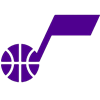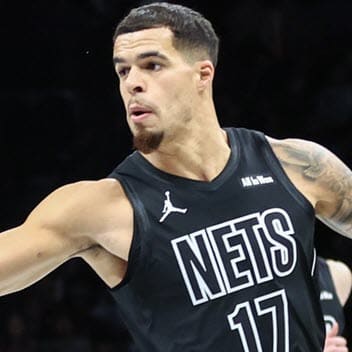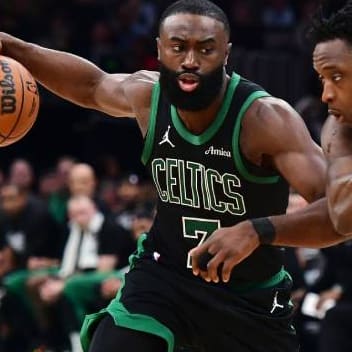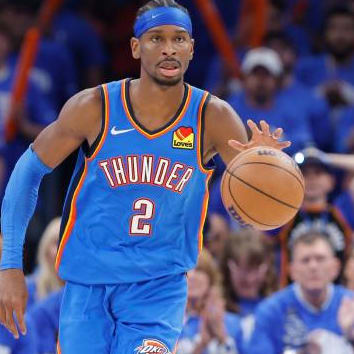Now 36, it's safe to say the best years are behind Love, making him a non-factor in all standard fantasy formats. He played in 55 games during the 2023-24 regular season, averaging a modest 8.8 points, 6.1 rebounds and 1.5 three-pointers in just 16.8 minutes per game, a career-low for the veteran. With his arrow pointed firmly in the wrong direction, there is almost no way Love will play a significant role this season, and we could see him out of the rotation at times, especially if Nikola Jovic, Jaime Jaquez and Kel'el Ware establish themselves as must-play guys. Managers in deeper formats could consider Love with a late-round pick, although his limited upside probably makes him nothing more than a streaming consideration. As for standard leagues, Love can be safely, yet affectionately overlooked.
In the twilight of his career, Love's days of being a fantasy-relevant player appear behind him. He ended the 2022-23 season as the 241st-ranked player in nine-category leagues, averaging 8.2 points per game, adding 6.4 rebounds and 1.6 three-pointers. While he has agreed to terms with the Heat for at least one more season, he will unlikely play a significant role on a team with title aspirations. For anyone in deeper formats, he may have limited value as a source of boards and threes. Although he started the majority of games after being traded last season and could do so this season, it would only be nominally. Love isn't expected to crack 30 minutes outside of emergencies.
For the first time since his sophomore year in the NBA, Love appeared off the bench more than he started in 2021-22. The Cavaliers drafted Evan Mobley in the 2021 Draft, pushing Love to a reserve role, while Mobley and Jarrett Allen started in the frontcourt, and Lauri Markkanen got the nod at small forward. However, it was still a successful year for Love, who placed second in Sixth Man of the Year voting behind the Heat's Tyler Herro. Love tallied 22.5 minutes per game and averaged 13.6 points on 43/39/84 shooting, 7.2 rebounds and 2.2 assists. Notably, he played 74 games -- his first time appearing in more than 60 since 2015-16. Love also ranked 127th in per-game fantasy production, making him viable as a bench piece in standard leagues. Not much should change for the 34-year-old this season, though he remains an injury risk -- something that will only increase with age. Also, considering his severely reduced role and best-case scenario outcome last season, it makes sense for Love to go undrafted in many standard formats. There are plenty of players with higher upside. Even managers in deep leagues have reason to pause with late picks.
Over the past three season, the longest consecutive games steak delivered by Love was 19 contests. And even then, he played only 26 minutes per game and shot 41.0 percent from the field. In other words, the 32-year-old veteran has struggled to stay healthy. The problem was further illuminated this July when Love opted out of Team USA Olympic competition due to a troubling calf injury. Last season, Love played a career-low 24.9 minutes per game and appeared in only 25 games. He also grabbed a career-worst 7.4 rebounds per game. Expect those rebound numbers to continue to fall with the Cavs adding 7-footers Evan Mobley, via the Draft, and Lauri Markkanen, via a sign-and-trade. With Mobley's slight frame and center Jarrett Allen having signed a new five-year contract, the rookie Mobley should see lots of development time at Love's usual power forward spot. Markkanen signed a four-year agreement, so clearly the Cavs are invested in him as well. That all said, Love can still drain three-pointers. The 13-year veteran hit 2.3 triples per game last year, his sixth straight season of making 2.1 or more three-pointers per contest. While Love owns a championship ring and has great name recognition, he can no longer be relied on to deliver consistent fantasy stats.
After appearing in just 22 games in 2018-19, Love managed only 56 contests in 2019-20 and has now played 60 or fewer games in four straight seasons. In his 12th NBA season, Love averaged 17.6 points, 9.8 boards, 3.2 assists and 2.6 triples on one of the worst teams in the Association. Banged up most of the season, Love turned it on at the end of the year and averaged 18.4 points, 10.8 boards, 4.3 assists and 2.8 triples over his final nine appearances. He shot 45/37/85 splits on the season and continued his run as one of the best floor-stretching bigs in the NBA. With those numbers, Love should remain a clear early- to mid-round fantasy selection in upcoming drafts, though he carries late-season risk given the durability concerns. As Cleveland projects to be one of the worst teams in the league and out of playoff contention, Love could see his playing time limited later in the year, as well.
Love appeared in only 22 games last season while attending to toe, back and shoulder injuries. There was little reason to rush him back into action, as the Cavaliers were one of the worst teams in the league during 2018-19, finishing with just 19 wins. Love clearly wasn't comfortable during his limited action, as he shot just 38.5 percent from the field. Still, his per-36-minute averages were on par with what we've come to expect from Love as a member of the Cavaliers (22.5 points, 14.4 rebounds, 2.9 assists). The two-time All-NBA selection will once again head into 2019-20 as the clear-cut best player on the roster, and there will be plenty of opportunities for him to rack up numbers. Fantasy owners' main concern should be Love's health. He's appeared in just 141 games across the past three seasons, and he'll be heading into his age 31 season on a rebuilding squad where youth development will presumably be the priority. Drafting Love has its risks, but a healthy season would mean big payoff for those who take the chance.
Love's 2017-18 season was hampered by a fractured left hand, which costed him a stretch of 20 straight contests and resulted in him playing in 60 or less games for the second straight campaign. Even when he was on the court, Love appeared to take a step back from a year prior, seeing his point (17.6), rebound (9.3) and assist (1.7) averages fall. He was still an asset as a three-point shooter, though, and hit 2.3 deep balls at a 41.5 percent clip, while adding an efficient 45.8 percent from the field and 88.0 percent from the charity stripe. Love's point, rebound and three-point totals, as well as his strong percentages, all kept him in the running as a top tier option that could be slotted in at both power forward or center. An already strong Fantasy asset, Love has the chance to up his production across the board during the upcoming season. Most notably comes the departure of superstar LeBron James, who led the Cavaliers in scoring, assisting and minutes last season, while falling behind just Love in the rebound department. With such a high usage player leaving, Love's numbers are likely going to be significantly impacted across the board. Look for his scoring and rebounding numbers to make the most notable jump, as Love's usage and shot attempts are going to trend upwards. The added usage could hurt his efficiency, though, so don't be overly surprised if Love's percentages dip a bit. Still, with Love officially being the new building block of the future and earning a four-year, $120 million extension, look for the offense to run through him and there's a chance we see some flashes of the player that originally broke out during his Minnesota days.
In his third season with Cleveland, Love had arguably his best year as a Cavalier, though he was limited to just 60 games due to a left knee injury that needed arthroscopic surgery in February. Still, when he did take the court, Love averaged three-year highs of 19.0 points, 11.1 rebounds and 2.4 three-pointers, while adding 1.9 assists and shooting 37.3 percent from the three-point line. That marked his best clip from deep during his time in Cleveland and he also shot a spectacular 87.1 percent from the free-throw line. The Cavaliers opted to trade Kyrie Irving to the Celtics in the offseason, bringing back Isaiah Thomas, Jae Crowder, Ante Zizic and a first-round pick in return. Crowder's arrival will likely have the most impact on Love, as that allows the Cavaliers to go with more small-ball lineups if necessary. While it's unclear exactly what the starting lineup will be, the Cavaliers could use Crowder at power forward and shift Love to center at times to create some mismatches in the frontcourt. That could allow Love to improve his rebounding numbers once again, though Thomas' presence, who averaged a whopping 28.9 points with Boston, could come at the expense of a few of Love's shot attempts. Still, Love shouldn't have much trouble approaching his 2016-17 averages and that should lock him in as a top-10 power forward. He'll be a double-double threat every night he sees the floor, while his value continues to be boosted by a strong perimeter game as well.
For the second straight season, Love's production paled in comparison to his pre-Cleveland numbers, but he appeared to grow more comfortable in his role as the third option behind LeBron James and Kyrie Irving. Love thrived early in the season while Irving missed time following offseason kneecap surgery, posting averages of 19.8 points, 11.8 rebounds and 2.4 assists per game through the end of November. But once Irving returned, Love's numbers began to regress, as he averaged just 14.0 points on 41.7 percent shooting in January and 15.1 points on 38.7 percent shooting in February. Still, Love closed the regular season with a respectable 16.0-9.9-2.4 line in 31.5 minutes per game, his lowest total since the 2009-10 season. Long considered a defensive liability, Love endured an up-and-down postseason but closed with a strong Game 7 against the Warriors in which he secured 14 rebounds and sealed the Cavaliers' victory with an improbable smothering of Stephen Curry as the clock ticked down. The possession -- and in a broader sense, the Cavaliers' title -- helped to put to rest the notion that Love can't be on the floor in crunch-time situations. Entering 2016-17, Love's role will remain relatively unchanged as the Cavaliers bring back nearly every integral piece from last season's roster. Getting Love more involved in the offense was a point of emphasis after Tyronn Lue replaced David Blatt as head coach, and that figures to carry over, though Love's game still remains heavily three-point dependent. Last season, a career-high 45 percent of Love's field-goal attempts came from beyond the arc, compared to 41 percent in 2014-15 and 35.5 percent in 2013-14, his final season with the Timberwolves.
Despite being on a team that won more games in one season than he had won in his first six years in the NBA, there was an air of disappointment that surrounded Kevin Love's first season in Cleveland. As the third option on the offense, Love's point production fell to 16.4 points, his lowest average since his second season in the league. He also failed to average double-digit rebounds (9.7 per game) for the first time since his rookie year. Love's other numbers – 34 minutes, 75 games, 43 percent from the field, 80 percent from the line, 2.2 assists, 0.7 steals, and 0.5 blocks – were reasonably similar to his career averages. The former Timberwolf did not get much of a taste of the playoffs as he suffered a separated shoulder in the first round against the Celtics and did not come back. He should be ready for the 2015-16 regular season. The big question in his second season in Cleveland is whether LeBron James and Kyrie Irving can better incorporate the 6-10 forward into the offense. Love will likely get more accustomed to his role in the defense and may get more touches within the arc (he took more than 40 percent of his shots from three-point land) to improve his overall effectiveness.
After spending six playoff-less years in Minnesota, Kevin Love seems like a shoe-in to make the postseason for the first time after coming to Cleveland. The three-time All-Star joined the Cavaliers in a three-team deal that sent number one picks Andrew Wiggins and Anthony Bennett to the land of 10,000 lakes. Love is coming off perhaps his finest NBA season. The 25-year-old was able to play a career-high 77 games while playing 36 minutes per game last season, averaging 26.1 points, 2.5 three-pointers, 12.5 rebounds (third best average in the league), and a career-high 4.4 assists to go along with 0.8 steals and 0.5 blocks. He converted 46 percent of his field goals, 38 percent from long range, and 82 percent from the charity stripe. While his numbers won't dip as much as Chris Bosh's did when Bosh went from Toronto to Miami, it seems unlikely that Love will be able to launch 18 shots and more than six three-pointers per game this season. Playing with LeBron James and Kyrie Irving will mean fewer offensive opportunities for the 6-10 forward, but there is a strong chance that his efficiency will improve greatly. Cleveland is not very deep in the frontcourt, so Love could see minutes at both power forward and center when coach David Blatt goes with a small-ball lineup.
Love battled through injuries with his hand and wrist, limiting his efficiency and ending his season early. In 2011-12, the forward averaged 26.0 points (45 percent from the field), 13.3 rebounds and 1.9 three-pointers made. While he managed to play just 18 games last season, he finished with averages of 18.3 points (35 percent from the field), 14.0 rebounds and 1.1 three-pointers made. News regarding his recovery status over the summer has been optimistic for the most part, and it would not be unreasonable to expect Love to have a monster bounce-back season. His lack of contribution in traditional power forward categories such as field goal percentage and blocks are well made up by his magnitude of points and rebounds, along with his ability to hit three-pointers. Love should be considered a first-round pick in almost all fantasy formats, and as long as he can remain healthy, he should return to being the elite fantasy option he once was. With fellow teammate Ricky Rubio manning the offense at the point guard position, and with rising center Nikola Pekovic forcing defensive pressure down low, Love will get enough touches and opportunities to put up strong fantasy numbers overall.
It seemed Love had established his fantasy value in 2010-11, when he averaged 20.2 points and 15.2 rebounds. How does it get better than that? How does six more points per game sound? Love built on his breakout 2010-11 season with even better production during the shortened 2011-12 NBA season, increasing his scoring average to 26.0 per game while not sacrificing too much in the way of rebounding (13.3). The presence of Nikola Pekovic lightened Love’s burden on the glass, allowing him to increase his 3-point attempts (5.1 per game). As a three-category (scoring, rebounding, three-pointers) monster, Love is a no-brainer first-round selection in fantasy drafts. However, you’ll want to make sure you’re covered in traditional big-man categories in which Love doesn’t do well. He managed just 0.5 blocks per game, and his shooting percentage dipped below 45 percent (44.8) for the first time in his career. Health-wise, Love was limited to 55 games (of a possible 66) because of a concussion. Obviously, we saw him playing in the Olympic Games, so that episode is no longer an issue. Though concussions do have a way of recurring.
Of all the players in the NBA who took a jump in fantasy value last season, Love might have made the biggest leap. A solid mid-round investment after his first two productive seasons with the Timberwolves, Love has developed into a fantasy stud that will be selected in the top-10 of nearly every draft this year. Powered by a streak of 53 consecutive games with a double-double, Love posted averages of 20.2 points and a league-leading 15.2 rebounds, making him the first NBA player to average 20 points and 15 rebounds since Moses Malone accomplished the feat during the 1982-83 season. While Love is an absolute monster on the glass, he doesn't do well in the other traditional big man stats, as his 47.0 percent from the floor and 0.4 blocks per game leave a lot to be desired from a power forward. Fortunately Love makes up for his lack of production in those areas by posting a strong free throw percentage (85.0) and hitting 1.2 three-pointers per game. His strength in scoring, rebounding and three-pointers already make him first-round option in fantasy, and if Love can ever develop his defensive game, he could one day challenge to be at the top of the heap.
Love is generally regarded as one of the top young bigs in the league, though we can't help but wonder if he'll ever reach that potential under Minnesota's current regime. Love's minutes – and by extension, his numbers – were badly limited last season by his team's decision that he and teammate Al Jefferson didn't have enough size to man the power forward and center spots at the same time. Jefferson is gone now, but he's been replaced by another undersized power forward in Michael Beasley, and team management committed big dollars to centers Darko Milicic and Nikola Pekovic – so playing Love at the pivot seems unlikely. Even as a reserve, Love will have fantasy value; he averaged a double-double last season despite the inconsistent playing time, is one of the league's better passers out of the high post, can hit the occasional three and is very good from the free throw line (81.5 FT% in 2009-10). We'd love to see what he can do given starter's minutes on a consistent basis – we just hope David Kahn and Kurt Rambis share our curiosity.
Love entered his rookie season with a few questions about how well his game would translate at the NBA level, but his consistent play has answered them so far. Love started the season coming off the bench, but was bumped to the starting lineup after Al Jefferson sustained a season-ending knee injury in February. Love seized the opportunity, averaging 13.1 points and 9.4 rebounds in 37 games as a starter. Jefferson is expected to be back at full strength when camp opens, but Love should stick with the starting unit, sliding over to power forward. The presence of Jefferson in the lineup should benefit Love’s offensive attack, as opposing teams will be more focused on stopping Big Al on the block. While Love will be a solid source of points and rebounds, it remains to be seen how much he’ll contribute on the defensive end. He plays steady defense, and he’s usually in the right position due to his high basketball IQ, but he lacks the athleticism to rack up many blocks or steals. Despite his defensive limitations, Love should improve during his sophomore campaign. Minnesota is in rebuilding mode, and Love is one of the centerpieces, teaming with Jefferson as the building blocks of the frontcourt.
Love was the subject of much debate all winter. He was an outstanding college player, no doubt, with excellent size and an outstanding feel for the game. But his athleticism – and generally pudgy appearance – gave doubters plenty of ammunition. But Love’s “measurables” impressed at the pre-draft workouts, and he shot up the draft boards – eventually landing in the fifth-overall slot. The late draft night trade that sent Love to from Memphis to Minnesota puts him in good position to succeed – he’ll have big man Al Jefferson to handle the heavy lifting in the paint and Mike Miller on the receiving end of his passes out of the high post. We envision him as a poor man’s Chris Webber – a big man who will score and rebound well, but whose biggest fantasy asset will be a surprisingly high assist total.
Love should emerge as a starter for Minnesota early in the season at center next to Al Jefferson. The T-Wolves thought enough of his skills that they traded No. 3 overall pick O.J. Mayo for him in a draft-day deal that also returned Mike Miller. Love may have a limited scoring game initially, as the T-Wolves have raved about his passing skills and may play farther outside of the lane than most true centers. He could develop into a poor man's Chris Webber – a big man who will score and rebound well, but whose biggest fantasy asset will be a surprisingly high assist total.




















